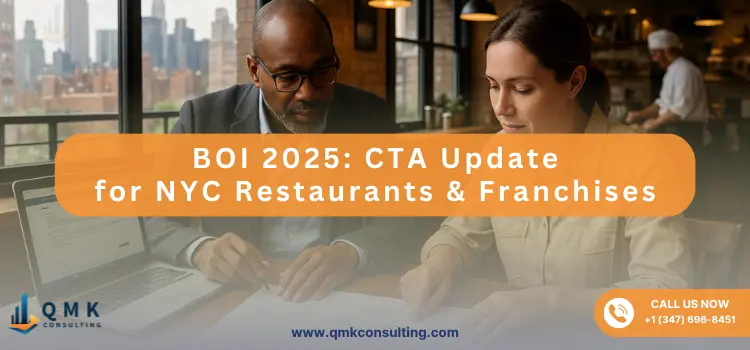
October 31, 2025 |Business Advisory Services


Status as of Oct 31, 2025: FinCEN’s Mar 26, 2025 interim final rule remains in effect. U.S. entities are exempt from CTA BOI reporting, while foreign reporting companies must file on the timelines noted below.
If you opened an LLC in the last few years, you probably heard that “every company must file beneficial ownership information (BOI) with FinCEN or face penalties.” That was the drumbeat through 2024. Then, in March 2025, Treasury and FinCEN changed course: through an interim final rule, the government removed BOI reporting for U.S. companies and U.S. persons.
For related 2025 planning that actually moves cash flow, see our guides on
**NYC PTET & the SALT workaround** and **OBBBA 2025 tax changes for restaurants & franchises.**
In plain English: domestic entities—the S-corps and partnerships most restaurant groups and franchisees use—are not required to file BOI with FinCEN under the Corporate Transparency Act (CTA) right now.
There’s one big carve-out: foreign reporting companies—entities formed under non-U.S. law that are registered to do business in the United States—still must report on a timeline that FinCEN clarified this spring.
Below is a straight-talk guide for owners and CFOs of NYC restaurants and franchise systems: what changed, who’s still in scope, and what to do so compliance doesn’t derail growth.
What changed (March 2025):
What didn’t change:
Most NYC restaurant groups and franchisees are not. You’re in this category only if the entity was formed under foreign law (for example, a Canadian or Cayman company) and it registered to do business in the U.S. If that’s you, FinCEN still expects a BOI report for the foreign entity, including its beneficial owners (individuals with substantial control or ≥25% ownership) and other data elements.
Owner action: If any of your holding companies, IP companies, or investment vehicles are non-U.S. entities registered in New York (or another state), put a pin in this—you remain on the clock.
Short answer: yes—keep your house in order. The rule moved fast and could move again. Three practical habits will protect you whether BOI reporting stays paused or returns in a revised form.
Centralize ownership records.
Maintain a private “control file” for each entity: cap table, operating agreement amendments, officer/director list, and a contact sheet for every owner (legal name, DOB, residential address, ID type, and last four of the TIN). If BOI reporting comes back or a bank asks, you’re ready without a fire drill.
Document “substantial control.”
BOI focuses on people with the keys, not just percentage owners. Capture who can appoint/remove officers, approve budgets, or sign for the company. That list changes when you add locations or new investors—update it at the same time you update your signer cards.
Map multi-entity structures.
Franchise operators often run opco/propco/IP-co stacks. Sketch how entities connect, who owns what, and which (if any) are foreign. That map helps with banking, audits, and eventual sale or recap.
Banking & credit. Credit renewals, SBA loans, and merchant processing reviews already ask for owner information. Clean records reduce delays that can freeze working capital when you’re opening a new store or refinancing equipment.
Entity creation at scale. If you form a new LLC for each location (common in franchising), having a repeatable onboarding checklist—signers, control list, owner IDs—keeps your timeline tight and legal fees contained.
Exit value. When buyers do due diligence on a multi-unit group, they want entity hygiene: clear ownership trails and no surprises. Good BOI-style records reduce the “risk haircut” on your valuation.
Want a quick, practical review of your entities—who’s exempt, who must report, and how to build a one-page ownership file that banks (and buyers) love? Get assistance and help from our experts at QMK Consulting. We’ll map your structure, file where required, and leave you with a simple playbook that protects profit and cash flow while you grow.
This article is educational only and not legal or tax advice. Rules can change; confirm facts with current FinCEN/Treasury guidance and your advisors.
Related reads: